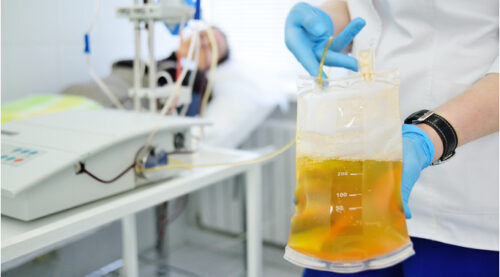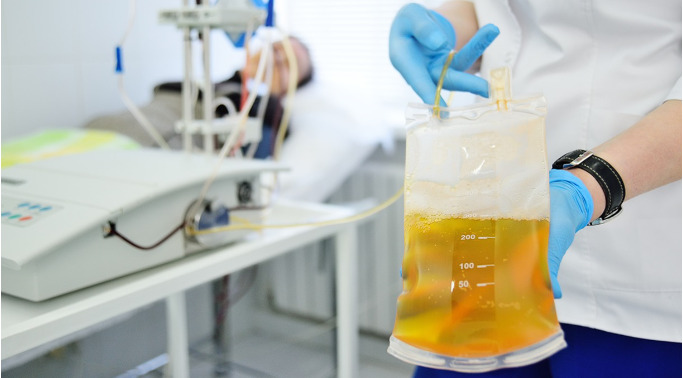新しい分析により、COVID-19と、必然的に到来する次のウイルス性パンデミックの両方において、入院を防ぎ、最終的に命を救うために回復期の血漿をどのように使用できるかが示されています。 A new analysis shows how convalescent plasma can be used to prevent hospitalizations and ultimately save lives, both for COVID-19 and for the next viral pandemic that inevitably arrives.
2023-02-21 ブラウン大学

◆Clinical Infectious Diseases誌に掲載された研究では、国際研究チームが臨床データを分析し、COVID-19の外来患者において、SARS-CoV-2に対する抗体を早期かつ大量に投与すると入院リスクが低下すると結論付けている。
◆COVID-19の初期の治療法としては、パックスロビドなどの抗ウイルス剤やモノクローナル抗体など、他にも同様の結果を得たものがいくつかありますが、研究者らは、現在も次のウイルスの大流行の初期にも、世界の人口の大多数が利用でき、かつ安価であるのは回復期血漿だけだろうと結論付けています。
◆分析対象は、アルゼンチン、オランダ、スペイン、米国の2カ国を含む4カ国で実施された5つの試験のデータです。Levine氏は以前、Johns Hopkins MedicineとJohn Hopkins Bloomberg School of Public Healthが主導した臨床試験において、Rhode Island Hospitalでの登録の監督を行いました。5つの試験を通じて、2020年1月から2022年9月までに、合計2,620人の成人患者が回復期血漿の輸血を受けていた。研究者らは、輸血のタイミングと投与量が、感染後28日間の患者の入院リスクにどのように影響するかを評価するために、個々の参加者データのメタ解析を実施した。
◆その結果、対照群1,315人中160人(12.2%)が入院したのに対し、COVID-19回復期血漿の投与を受けた1,305人中111人(8.5%)と、入院が30%減少したことが明らかになりました。
◆注目すべきは、最も強い効果が、病気の初期と抗体レベルの高い血漿を投与された患者さんで見られたことです。これらの患者さんでは、入院が50%以上減少したのです。
<関連情報>
- https://www.brown.edu/news/2023-02-21/convalescent-plasma
- https://academic.oup.com/cid/advance-article/doi/10.1093/cid/ciad088/7048396?login=false
COVID-19回復期血漿外来療法による外来患者入院の予防。5つの無作為化試験から得られた個々の参加者データのメタ分析 COVID-19 Convalescent Plasma Outpatient Therapy to Prevent Outpatient Hospitalization: A Meta-analysis of Individual Participant Data From Five Randomized Trials
Adam C Levine, Yuriko Fukuta, Moises A Huaman, Jiangda Ou, Barry R Meisenberg, Bela Patel, James H Paxton, Daniel F Hanley, Bart JA Rijnders, Arvind Gharbharan,Casper Rokx, Jaap Jan Zwaginga, Andrea Alemany, Oriol Mitjà, Dan Ouchi, Pere Millat-Martinez, Valerie Durkalski‑Mauldin, Frederick K Korley, Larry J Dumont, Clifton W Callaway, Romina Libster, Gonzalo Perez Marc, Diego Wappner, Ignacio Esteban, Fernando Polack, David J Sullivan
Clinical Infectious Diseases Published:21 February 2023
DOI:https://doi.org/10.1093/cid/ciad088
Abstract
Background
Outpatient monoclonal antibodies are no longer effective and antiviral treatments for COVID-19 disease remain largely unavailable in many countries worldwide. Although treatment with COVID-19 convalescent plasma is promising, clinical trials among outpatients have shown mixed results.
Methods
We conducted an individual participant data meta-analysis from outpatient trials to assess the overall risk reduction for all-cause hospitalizations by day 28 in transfused participants. Relevant trials were identified by searching MEDLINE, Embase, MedRxiv, World Health Organization, Cochrane Library, and Web of Science from January 2020 to September 2022.
Results
Five included studies from four countries enrolled and transfused 2,620 adult patients. Comorbidities were present in 1,795 (69%). The virus neutralizing antibody dilutional titer levels ranged from 8 to 14,580 in diverse assays. 160 (12.2%) of 1315 control patients were hospitalized, versus 111 (8.5%) of 1305 COVID-19 convalescent plasma treated patients, yielding a 3.7% (95%CI: 1.3%-6.0%; p=.001) absolute risk reduction and 30.1% relative risk reduction for all-cause hospitalization. The hospitalization reduction was greatest in those with both early transfusion and high titer with a 7.6% absolute risk reduction (95%CI: 4.0%-11.1%; p=.0001) accompanied by at 51.4% relative risk reduction. No significant reduction in hospitalization was seen with treatment > 5 days after symptom onset or in those receiving COVID-19 convalescent plasma with antibody titers below the median titer.
Conclusions
Among outpatients with COVID-19, treatment with COVID-19 convalescent plasma reduced the rate of all-cause hospitalization and may be most effective when given within 5 days of symptom onset and when antibody titer is higher.



